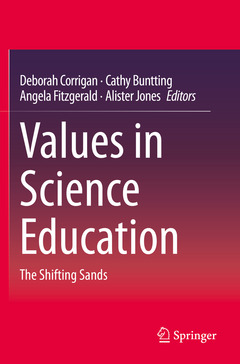Values in Science Education, 1st ed. 2020 The Shifting Sands
Coordonnateurs : Corrigan Deborah, Buntting Cathy, Fitzgerald Angela, Jones Alister

In 2007, the Monash-Kings College London International Centre for the Study of Science and Mathematics Curriculum edited a book called The Re-emergence of Values in Science Education. This book reflects on how values have been considered since this original publication, particularly in terms of socio-cultural, economic and political factors that have impacted broadly on science, technology and society, and more specifically on informal and formal science curricula. Hence, the title of this book has been framed as Values in Science Education: The shifting sands. As in the first book, this collection focuses on values that are centrally associated with science and its teaching, and not the more general notion of values such as cooperation or teamwork that are also important values in current curricula. Such values have indeed become more of a focus in science education. This may be a response to the changing global context, where technological changes havebeen rapid and accelerating. In such complex and risky environments, it is our guiding principles that become the important mainstays of our decisions and practices. In terms of science education, what is becoming clearer is that traditional content and traditional science and scientific methods are not enough for science and hence science education to meet such challenges. While shifts in values in science education continue, tensions remain in curriculum development and implementation, as evidenced by the continued diversity of views about what and whose values matter most.
1 The Shifting Sands of Values in Science Education; Deborah Corrigan, Cathy Buntting, Alister Jones and Angela Fitzgerald.- Section 1: Values in Science.- 2 Communicating Certainty and Uncertainty in Science in Out-of-School Contexts; Leonie Rennie.- 3 Teachers’ Perceptions of the Values that Underpin Science as a Way of Thinking and Acting; Kathy Smith and Deborah Corrigan.- 4 Exploring Values of Science through Classroom Practice; Rebecca Cooper and John Loughran.- Section 2: Values for Science Education.- 5 Science as “Just Opinion” – the Significance for Science Education of Emerging Social Media; Karen Marangio and Richard Gunstone.- 6 Changing Values in Science Education and the Emergence of Science Gallery; Joseph Roche and Colette Murphy.- 7 Using Biotechnology to Develop Values Discourse in School Science; Cathy Buntting and Alister Jones.- Section 3: Values of Science Education Practice.- 8 What do Science Teachers Value? How can Values Change During Professional Learning?; Shirley Simon and John Connolly.- 9 Exploring the Professional Learning Values Inherent in Japan’s Lesson Study; Tetsuo Isozaki.- 10 Changing Context, Shifting Values? Science, the Environment and Citizenship at Minstead Study Centre 12 Years on; Justin Dillon and Alan Reid.- Section 4: Values of Science Education Systems.- 11 Intended, Achieved and Unachieved Values of Science Education; Gillian Kidman and Peter Fensham.- 12 The Place of Values in the Aims of School Science Education; Jennifer Mansfield and Michael Reiss.- 13 Exploring Values Through Lived Experiences of the World Heritage Site of Petra: A Case Study; Angela Fitzgerald and Diana Abouali.
Cathy Buntting is a Senior Research Fellow at the University of Waikato. She has a background in biochemistry and science education research and is director of the New Zealand Science Learning Hub, a large online portal linking the science and education sectors. Recent research projects have focused on students’ futures thinking and the use of digital technologies in education.
AngelaFitzgerald is an Associate Professor in Primary Science Education at University of Southern Queensland and has been involved in science education in primary and secondary settings as a teacher and teacher educator for 15 years, many of those at Monash University. Her research focuses mainly on supporting primary pre- and in-service teachers in developing their confidence and competence in science learning and teaching.
Alister Jones is a Research Professor and Senior Deputy Vice-Chancellor of the University of Waikato, New Zealand. He is a Strategic Advisor for the New Zealand Science Learning Hub, and Director of a number of education-related companies. He has been consulted on educational development in New Zealand, Australia, the UK, USA, Hong Kong, Chile and Thailand.
Date de parution : 05-2021
Ouvrage de 229 p.
15.5x23.5 cm
Date de parution : 05-2020
Ouvrage de 229 p.
15.5x23.5 cm
Thèmes de Values in Science Education :
Mots-clés :
Aim of Science Education; Bildung; Changing Valves in Science Education; Environmental Educators; Nature of Science; Outcome-Based Education; Operationalisation of Values in Science Education; Revision of Science Teaching; School Science; Science Education Thinking; Science Education Provided by Schools; School Science Curriculum; Science Through Classroom Practice; STEM-Related Careers; STEM Education; Values in Science Education; Workers with STEM Qualifications; learning and instruction



